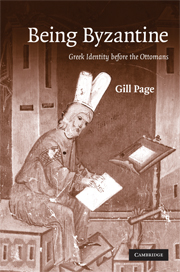Book contents
- Frontmatter
- Contents
- List of illustrations
- Acknowledgements
- A note on the use and transliteration of Greek
- Abbreviations
- Reference works
- Introduction: The Frankish conquest of Greece
- 1 Ethnic identity?
- 2 Byzantine identities
- 3 Niketas Choniates
- 4 The thirteenth century: ambition, euphoria and the loss of illusion
- 5 The nightmare of the fourteenth century
- 6 Meanwhile, a long way from Constantinople …
- 7 The long defeat
- 8 Roman identity and the response to the Franks
- Glossary
- Map 1 The Aegean region
- Map 2 The Peloponnese
- Appendix 1 Key content items
- Appendix 2 The origins of the Chronicle of the Morea
- Bibliography
- Index
2 - Byzantine identities
Published online by Cambridge University Press: 24 November 2009
- Frontmatter
- Contents
- List of illustrations
- Acknowledgements
- A note on the use and transliteration of Greek
- Abbreviations
- Reference works
- Introduction: The Frankish conquest of Greece
- 1 Ethnic identity?
- 2 Byzantine identities
- 3 Niketas Choniates
- 4 The thirteenth century: ambition, euphoria and the loss of illusion
- 5 The nightmare of the fourteenth century
- 6 Meanwhile, a long way from Constantinople …
- 7 The long defeat
- 8 Roman identity and the response to the Franks
- Glossary
- Map 1 The Aegean region
- Map 2 The Peloponnese
- Appendix 1 Key content items
- Appendix 2 The origins of the Chronicle of the Morea
- Bibliography
- Index
Summary
This chapter has two objectives. Firstly, by providing a portrait of Byzantine Roman identities in the years leading up to the Fourth Crusade, it aims to set the scene for the investigation of Roman identities during the Frankish period. How did the Byzantine Romans view their state at the end of the twelfth century, and what was their sense of themselves as Romans? Secondly, it seeks to explore the importance and justify the choice of the key content items to be analysed in the sources. What was the history of words like ‘Pωμαĩος/‘Pωμαïκóς (Rhomaios/Rhomaïkos, Roman, noun and adjective), “Eλλuν (Hellen, Hellene), βάρβαρος (barbaros, barbarian) or ἔϑνος (ethnos, group), what might they have been expected to convey to the Byzantine Romans? This must be the underpinning for a detailed consideration of the writers of the Frankish period.
BYZANTIUM BEFORE THE FOURTH CRUSADE
When Constantinople fell to the crusaders in 1204, it was a huge shock to the self-image of the Byzantine Romans. Nevertheless, it might also have seemed to be the logical outcome of a period of crisis and decline. The preceding century and a half had been a time of significant changes. Firstly, the empire had lost a great deal of territory in the east, fundamentally altering the make-up and operation of the state. The relationship of Byzantium with its neighbours had, in effect if not in imperial theory, changed from that of superior superpower to peer.
- Type
- Chapter
- Information
- Being ByzantineGreek Identity Before the Ottomans, 1200–1420, pp. 27 - 71Publisher: Cambridge University PressPrint publication year: 2008



